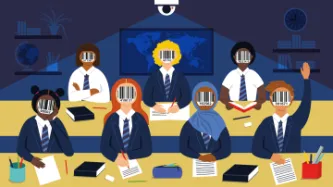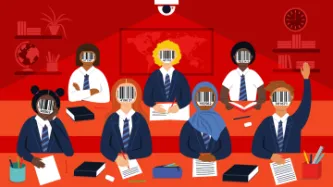Search
Content type: Advocacy
The rapid expansion of educational technologies (EdTech) has introduced serious concerns about human rights protection in educational spaces. This briefing explores the impact of facial recognition technology (FRT) and heightened surveillance in these settings, highlighting many complex and multifaceted issues that demand careful consideration from a human rights perspective. From the erosion of privacy and the securitisation of educational spaces - that undermines the learning and growth…
Content type: Long Read
Increasingly, EdTech systems are less about teaching than about monitoring, security and ‘safety’ – although those aims are often mixed with wider educational claims.For instance, one company offering “high quality surveillance systems and CCTV for schools including sophisticated infra-red cameras which record in the darkest areas” claimed that these both deter “bad or antisocial behaviour from pupils, parents and visitors” and improve the concentration, productivity and attainment of the…
Content type: Advocacy
In May 2024, we made a submission for the forthcoming report of the UN Special Rapporteur on the right to education to the General Assembly in October 2024.
Amongst others we recommend the UN Special Rapporteur for this upcoming report to:
Underline the need for a human rights-based approach to all AI systems in the education sector and describe the necessary measures to achieve it.
Reassert that any interference with the right to privacy and the advancement of the right to education due to…
Content type: Advocacy
At PI we have been observing with concern the rapid expansion of technologies in educational settings, which has included a wide array of tools that allow the surveillance of students and academic staff, to the detriment of their privacy and academic freedom. We consider this upcoming report as an essential platform to examine the intricate interplay between academic freedom, freedom of expression, and surveillance conducted by both public and private entities through Education…
Content type: Advocacy
Privacy International (PI) welcomes the opportunity to provide input to the forthcoming report the Special Rapporteur on contemporary forms of racism, racial discrimination, xenophobia and related tolerance to the 56th session of Human Rights Council which will examine and analyse the relationship between artificial intelligence (AI) and non-discrimination and racial equality, as well as other international human rights standards.AI applications are becoming a part of everyday life:…
Content type: Long Read
Introduction
India’s educational system is the largest in the world, with over 250 million students, 50% of whom attend publicly administered schools.
The autonomy given by the Indian Constitution to the 28 states and 8 union territories means that the right to education is implemented quite differently in each one, respecting culture, language, and other local specificities. Educational policies are suggested at the national level by various autonomous agencies and states can implement them in…





